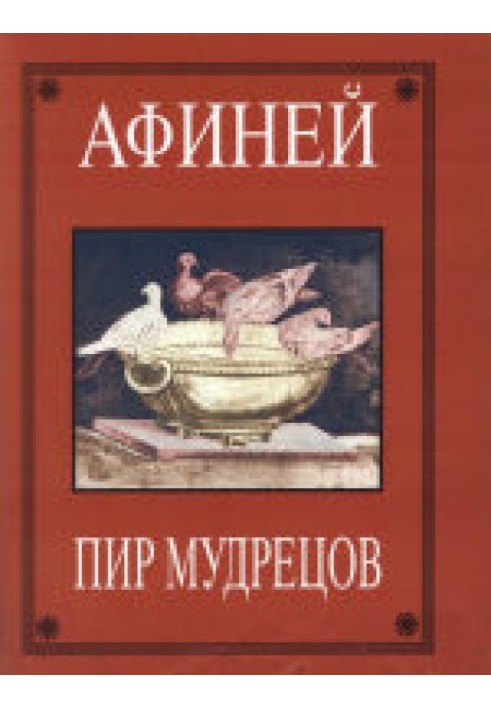Athenaeus. Feast of the Wise. In 15 books. Books I-VIII
 Instant download
Instant download
after payment (24/7)
 Wide range of formats
Wide range of formats
(for all gadgets)
 Full book
Full book
(including for Apple and Android)
The “Feast of the Wise Men” describes in the form of a dialogue a lot of things relating to the morals, public and private life of the ancient Greeks, as well as the ancient Greek sciences and arts. And although all this information is presented for the purpose of entertainment and demonstration of one’s own erudition, this collection serves as an important source of knowledge about ancient Greek life, replacing in this regard some of the lost works of other poets and writers. The rich Roman Larensius gathers in his house the best experts in all kinds of learning . Nothing remarkable was left unmentioned in their speeches.
Contents: Athenaeus. Feast of the Wise. Books I–VIII. Translation by N. T. Golinkevich, edited by M. L. GasparovBook One (based on Byzantine extracts). Introduction. Praise to the master of the feast, Larencius. About hospitality. Wit at the table. Gourmet Philoxen. Culinary Apiky. – The present century and the past century. On the moderation of Homeric heroes. Number of daily meals. Ball game. Music at the table. Delicacy of food. Leisure. Incense. Jesters. Dancing. Drinking at feasts. More about Homer’s heroes: sports, fishing, bird catching. - About wine. Invention of wine. What city is famous for what? Catalog of wines (among them Chios, Thasian, Lesbian, Leucadian, Phoenician, Lampsacan, Icarian, Pramnaian, Corinthian, Biblical, floral, from Italian - Albanian and Falero). About the wine-loving Egyptians. Book two (based on Byzantine extracts). About wine (continued): Oineus, Dionysus, drinking, the drunken behavior of young Sicilians (according to Timaeus), diluting wines, about the drinks of the gods. - Water. - Honey. – About the word “on an empty stomach.” - About the decoration of the halls. – Catalog of snacks (including: damask figs, cherries, mulberries, nuts, almonds, peas, wolf beans, beans, olives, radishes, pine cones, aperitif, mallow, pumpkins, mushrooms, grazing grass, truffle, nettles, asparagus, shellfish, leeks, blackbirds, warblers , finches, blackbirds, starlings, sparrows, pig's brains, olive oil, fish soup, vinegar, bread, lettuce, rose hips). Book Three (beginning - based on Byzantine extracts). About the fruits. Egyptian water lilies. Figs. Apples. Peaches. - About shellfish. Pearl. - Offal. - Dispute between Kinulka and Ulpian. - About the pig's uterus. – A digression on classical feasts. – Again about sea animals: crabs, shrimp. – About bread (52 types of products). - About corned beef. - Barbarisms. - Drinking water. Groats. Flour. Book four. About feasts. Feast of the Macedonian Karan (according to Hippolochus). - About the luxury of barbaric life. – About the Attic symposiums (with the insertion of the parody Matrona). Comparison of Spartan feasts with Cretan ones, Greek ones with Persian ones. The luxury of the Persian court. – Pastimes of Antony and Cleopatra. – Descriptions of meals of various peoples. - Kinulka's squabble. - Cebet's Feast. Lentil soup. Magnus reprimands the Cynics. - About extravagance. - Cook's utensils. – About types of cookies. – Cooking art of the Delians. – About music: various instruments, playing the flutes. Book five. About feasts and holidays (continued). Introduction. - About Homeric feasts. Comparing them with the classic ones. - The extravagances of Antiochus Epiphanes (according to Polybius). – Celebration of Dionysius in Alexandria (according to Callixenus). – Ships of Ptolemy Philopator (according to Callixenes). Hieron's ship (according to Moschion). - Feasts of various kings. – Philosophers in battle and on the throne: tyranny Athenion in Athens (according to Posidonius), Masurius denounces Socrates and his students. – About the Gorgons. Book Six. Introduction. - About fish. Fish trade in Athens (based on quotes from comedians). - About silver utensils. - About gold and silver. – About parasites (about the ancient meaning of the word “parasite”, famous parasites, etc.) – Famous flatterers. – About slaves (history, rebel Drimak, utopias of comedians, the number of slaves in the classical era, slaves in Rome). Book seven. Introduction. About meal times. - About pleasure. – About fish (continued). Alphabetical catalog of fish. Including: wrasse, sea bass, sacred fish, sardines, anarrich, spiny ray, monkfish, flounder, eel. – A digression on the art of cooking; Menecrates-Zeus. – Continuation of the catalog: spotted shark, croaker, river eel, elop, red mullet, Spindlefish, Tuna, Golden Mackerel, Wrasse, Cyfar, Triton, Mullet, Sea Bass, Stingray, Moray, Anchovy, Blacktail, Mormir, Electric Ray, Swordfish, Orff, Tuna, Octopus, Crabs, Grouper, etc .Book eight. About fish (continued). Stories about amazing fish. – Food writers and gourmets. – Funny stories about the cithara player Stratonik. – Criticism of the natural science works of Aristotle. – Fish through the eyes of a doctor. – About the names of feasts.
Data sheet
- Name of the Author
- Афиней
- Language
- Russian
- Translator
- Николай Тимофеевич Голинкевич

















